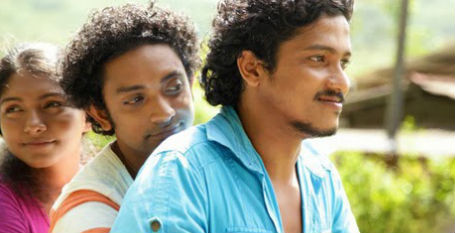Three scantily clad young adults with wet hair flop casually onto soft grass. Exhausted from spontaneously swimming in the nearby lake, the trio smiles warmly, exerting an air of being completely comfortable in each other’s company.
One of the young lads turns to the other two, a male and a female, and dangles a frangipani flower in front of them, remarking “this frangipani has six petals.” There is an atmosphere of closeness but also of something important left unsaid in this rural village in Sri Lanka.
These three young Sri Lankans are the protagonists in Visakesa Chandrasekaram’s thought-provoking and down-to-earth movie, Frangipani. As one of the most highly acclaimed showings at the Hong Kong Lesbian and Gay Film Festival which wrapped up last month, we caught up with Chandrasekaram to find out a little bit more about his work.
Frangipani is somewhat of a bildungsroman; it follows three characters on their journey from adolescence to adulthood. The entwined stories of the threesome tackle issues of identity, family, sexuality, desire, and destiny.
Chandrasekaram confided in us that the film’s narrative is derived from close personal experience. He did not divulge whether a certain character or experience is a direct portrayal of something from his own life, but he did remark that “the film is typical in many ways of the experience of LGBT in Sri Lanka, typical of the experience that I myself had.”
Frangipani, then, is a very Sri Lankan film. To watch it is to be immersed in a culture that we may not be familiar with. The fact that the film is authentically Sri Lankan (and in fact the country’s first full length LGBT movie) may be at its core, but also caused quite a lot of obstacles to the film’s production.
In a cruel twist of irony, although Frangipani has been heralded at film festivals worldwide it has not been licensed by censors in its home country. Chandrasekaram is pessimistic about this ever happening. The conservative attitudes in Sri Lanka (homosexuality is illegal under article 365A which prohibits engaging in "gross indecency") created problems in terms of investment and finding actors. In fact, the two main male actors were only found days before shooting begun after many others pulled out.
Chandrasekaram explained how other areas of film give a unique insight into the lives of LGBT Sri Lankans. For example the film pivots on the love triangle, and Chandrasekaram told me that conservative attitudes in his home country meant that many gays in Sri Lanka will have a history in which a woman was present.
Another interesting aspect is the presentation of the transgender community in the film. As Chandrasekaram points out, the transgender community is often the tightest and the first to establish itself in the enivornment of oppression.
The ‘Sri Lankaness’ of the film, however, is not only key to its charm but is also an important part of what Chandrasekaram wanted to achieve in the film. By presenting the film within the discourse of a typical Sri Lankan cinema (the movie even features a Bollywood-style number written by Chandrasekaram himself), Chandrasekaram hopes to push LGBT issues onto the agenda through a normalized discourse.

